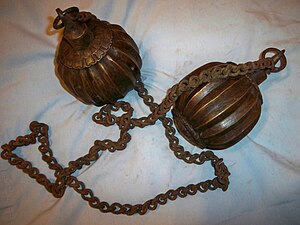This article has multiple issues. Please help improve it or discuss these issues on the talk page. (Learn how and when to remove these messages)
|

The meteor hammer (Chinese: 流星錘; pinyin: liúxīng chuí), often referred to simply as meteor (Chinese: 流星; pinyin: liúxīng), is an ancient Chinese weapon, consisting at its most basic level of two weights connected by a rope or chain. One of the flexible or "soft" weapons, it is referred to by many different names worldwide, dependent upon region, construction and intended use. Other names in use include dai chui, flying hammer, or dragon's fist. It belongs to the broader classes of flail and chain weapons. There is little evidence that they saw use in actual historical combat.
Design

A meteor hammer consists of a flexible chain or rope with a weight attached to one or both ends. Their construction is similar to a bola, but they are heavier and are not suitable for throwing. As a flexible weapon, meteor hammers can be easily concealed, and may be used as a defensive or surprise weapon.
Using a meteor hammer involves swinging the weight around the body to build up angular momentum, and then striking at the target. If the weight is swung around the intended target, the long length of chain may become wrapped around the body, limbs, or weapons.
Types

There are two types of meteor hammers: a double-headed and a single-headed version.
The double-headed meteor hammer is typically 2–3 metres (6.6–9.8 feet) in length with a spherical head on each end. While the ends of the meteor hammer can be heavier than a rope dart head, the difference in weight is normally minimal. Some meteor hammers have much lighter heads. The lighter versions of this weapon are typically used for practice and for modern wushu displays since they are faster and less dangerous. Since the meteor has two heads, one can be used offensively while the other can be used to defend, parrying attacks or ensnaring an opponent's weapon to attempt to disarm them.
The single-headed version of this weapon is used in a similar manner to the rope dart in that it is a long reach weapon with a single head. The main difference between the single-headed meteor hammer and a rope dart is that traditionally the meteor hammer has a rounded head. The head can traditionally weigh up to 3 kilograms (6.6 pounds) and is attached to a rope that can be 6 metres (20 feet) in length (in contrast a rope dart is typically 3.6 metres (12 feet) long). Because of these traits, a single-headed meteor hammer can deliver a great amount of force to a target, however it is very difficult to control.
In popular culture
Further information: Meteor (juggling)- In the 1978 film Crippled Avengers, Mr. Wan, played by Wang Lung Wei, was an expert with the weapon.
- In the 2000 film Crouching Tiger, Hidden Dragon, a warrior uses dual melon hammers in the tavern fight scene.
- In the 2000 film Romeo Must Die, Jet Li uses a fire hose as a makeshift version of the weapon.
- In the 2000 film Shanghai Noon, Jackie Chan uses a rope and horseshoe to fashion a makeshift version of the weapon.
- In the 2003 film Kill Bill: Volume 1, Gogo Yubari, played by Chiaki Kuriyama, uses a modern version of the weapon.
- In the 2005 film The Promise, General Guangming, played by Hiroyuki Sanada, was an expert with the weapon.
- In the 2007 TV series Juken Sentai Gekiranger, the GekiHammer is based on the meteor hammer.
- In the 2008 TV series Power Rangers Jungle Fury, the Jungle Mace is based on the meteor hammer.
- In the 2011 book Assassin's Creed: The Secret Crusade, Moloch (also known as "The Bull"), one of the protagonist Altaïr's targets, uses a meteor hammer with "unfailing accuracy" and ruthlessness.
- In the 2014 light novel series Re:Zero − Starting Life in Another World, Rem is an expert with this weapon.
- In the 2018 book River of Teeth Regina Archambault's weapon is a meteor hammer.
- In the 2021 TV series Kung Fu, one of the eight sacred weapons is a meteor hammer.
See also
- Bolas
- Chain whip
- Chigiriki
- Eskimo yo-yo
- Fire dancing
- List of martial arts weapons
- Meteor (juggling)
- Morning star (weapon)
- Nunchaku
- Poi (juggling)
- Rope dart
- Suruchin
- Zhou Tong (archer)
References
- "Chinese Kung Fu – Meteor Hammer". China A-2-Z. March 6, 2009. Archived from the original on September 23, 2009. Retrieved 30 September 2022.
- Vinson, Patrick. "Flexible Weapons: A Basic Introduction". Wing Lam Enterprises. Archived from the original on 7 January 2009. Retrieved 30 September 2022.
External links
- Fire Meteor Tribe.net
- Freestyle Meteor Info Page
- Shaolin Kung Fu Australia
- The Chinese Olympic Committee Official Website
- Rare Kung Fu Weapons
- Nine Dragon Baguazhang
| Types of Chinese weaponry | |||||
|---|---|---|---|---|---|
| Swords |
| ||||
| Polearms |
| ||||
| Roped/chained | |||||
| Projectile |
| ||||
| Handheld |
| ||||
| Protection |
| ||||
| Major lists | |||||